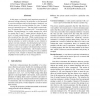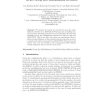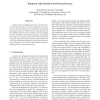127 search results - page 16 / 26 » Proving Properties of Security Protocols by Induction |
105
click to vote
CSFW
2006
IEEE
15 years 5 months ago
2006
IEEE
In this paper we formally study important properties of electronic voting protocols. In particular we are interested in coercion-resistance and receipt-freeness. Intuitively, an e...
IJISEC
2007
14 years 11 months ago
2007
Abstract. We examine the popular proof models for group key establishment of Bresson et al. [BCPQ01,BCP01] and point out missing security properties addressing malicious protocol p...
124
click to vote
IJNSEC
2008
14 years 11 months ago
2008
Most of the current security architectures for grid systems use conventional public key infrastructure (PKI) to authenticate grid members and to secure resource allocation to thes...
74
Voted
EUROCRYPT
2009
Springer
16 years 7 days ago
2009
Springer
The notion of Zero Knowledge Proofs (of knowledge) [ZKP] is central to cryptography; it provides a set of security properties that proved indispensable in concrete protocol design...
118
click to vote
CSFW
2005
IEEE
15 years 5 months ago
2005
IEEE
A number of key establishment protocols claim the property of forward secrecy, where the compromise of a longterm key does not result in the compromise of previously computed sess...



